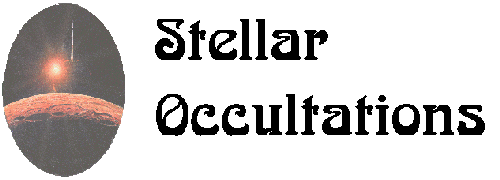

Occultations occur when a moving object, such as a planet or the moon, blocks the light coming from a more distant object, such as a star. Check out this movie of a lunar occultation.
For abstracts of papers and tables predicting occultations of stars by solar system objects, the places on earth where they may be observed, and observing conditions, click on the appropriate planet name.
A summary paper was presented at 1995's AAS/DDA meeting
Trans-Neptunian Objects (TNOs)
[
Tycho-2 Stars 2001-2003 (F. Marchis and J. Berthier)]
Pluto
[PPM Stars 2000-2050]
[P42 July 9, 1998]
Neptune
[PPM Stars 2000-2050]
[Triton]
[June 1983]
Uranus
[PPM Stars 2000-2050]
[Discovery of the Uranian rings, March 10, 1977]
Chiron
Saturn
[PPM Stars 2000-2050]
[3 December 1999]
Jupiter
[5 November 2000]
[PPM Stars 2000-2050]
Asteroids (IOTA)
The Moon (IOTA)
Mars
[PPM Stars 2000-2050]
Venus
[PPM Stars 2000-2050]
[SAO 160149 January 21, 2003]
Mercury
Picture: "Eclipse from Rhea" by William K. Hartmann,
shows "an eclipse of the Sun by Saturn, seen from a point near one of
Saturn's moons." It was painted in October 1984 and is used by permission
of the owner.
